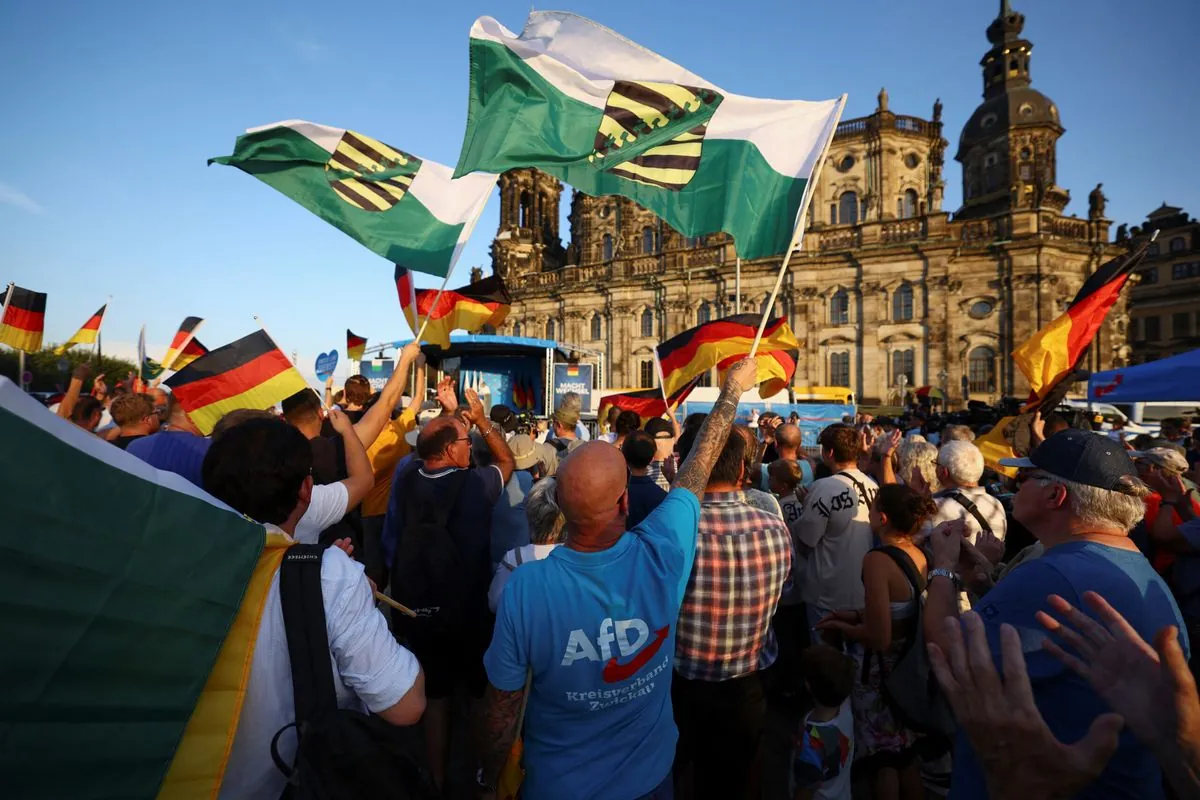Far-Right AFD Surges in East German Elections, Challenging Scholz's Leadership
Alternative for Germany achieves record results in Thuringia and Saxony, putting pressure on Chancellor Olaf Scholz. Coalition government faces criticism amid economic challenges and immigration concerns.

In a significant political shift, the far-right Alternative for Germany (AFD) party has achieved unprecedented success in recent regional elections in Thuringia and Saxony. The results have sent shockwaves through Germany's political landscape, particularly impacting Chancellor Olaf Scholz and his coalition government.
In Thuringia, a central German state known for its forests and winter sports, the AFD secured 33% of the vote, marking their strongest performance since the party's founding in 2013. Meanwhile, in Saxony, an eastern state bordering Poland and the Czech Republic, the AFD is in a tight race with the center-right Christian Democratic Union (CDU), both hovering around 30% support.
These results have placed immense pressure on Chancellor Scholz, whose Social Democratic Party (SPD) is projected to receive a mere 6.5% of the vote in Thuringia. The SPD's coalition partners, the Greens and Free Democratic Party (FDP), fared even worse in this electoral test, occurring just a year before the next federal election.

The AFD's success comes despite recent controversies, including allegations of members discussing mass deportations of foreigners and a senior party figure's controversial statements about the Waffen-SS. However, these issues did not deter voters in East Germany, a region that was part of the Soviet bloc until German reunification in 1990 and where the AFD has found strong support.
Chancellor Scholz faces mounting challenges beyond these election results. His approval ratings have plummeted, with over 70% of Germans expressing dissatisfaction with his leadership. The "traffic light coalition" government, comprising the SPD, Greens, and FDP, is struggling with a €17 billion budget deficit and is considered one of the least popular administrations in modern German history.
"This result shows that the people of Thuringia and Saxony want real change. We are ready to take on the responsibility of governance."
The rise of the AFD reflects growing public concerns over immigration, the cost of living crisis, and the government's environmental policies. Despite Germany being one of the largest financial supporters of Ukraine since Russia's invasion, Scholz's administration has struggled to communicate its achievements effectively.
In response to these challenges, Scholz has recently ordered a crackdown on illegal immigration, including initiating deportations to Afghanistan and reducing benefits for asylum seekers arriving from other EU countries. However, these measures appear to have come too late to influence the regional election outcomes.
As Germany approaches the 2025 federal elections, the political landscape is becoming increasingly complex. The CDU, which dominated German politics for much of the post-war period under leaders like Angela Merkel, now faces the difficult task of potentially forming a coalition government with parties across the political spectrum.
Ironically, the policies of open borders and relations with Russia, implemented during Merkel's 16-year tenure, have contributed to the current political upheaval. The SPD, Germany's oldest existing political party founded in 1863, now finds itself in a precarious position, a far cry from its historical role as the only party to vote against the 1933 Enabling Act that facilitated Hitler's rise to power.
As Germany grapples with these political shifts, the country's commitment to its Energiewende policy, aimed at transitioning to renewable energy sources, and its position as the EU's largest economy, add further complexity to the challenges ahead. The coming months will be crucial in determining the future direction of German politics and its impact on the broader European landscape.


































